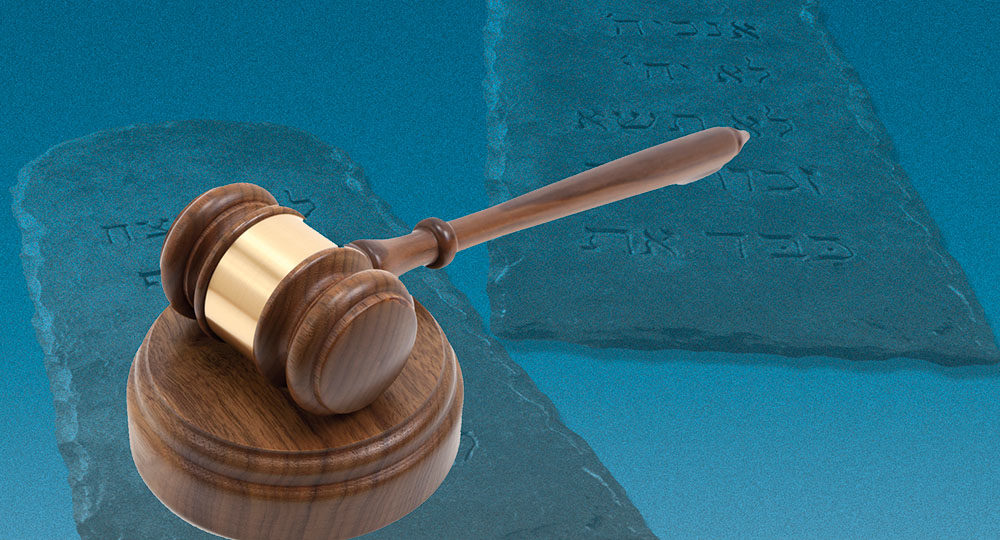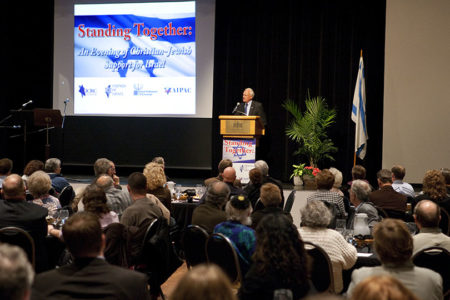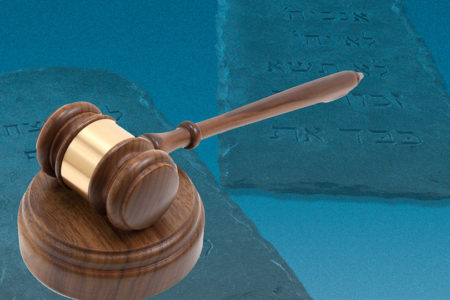Show Me the Law and I’ll Show You the Lawgiver
In February 2011 the U.S. Court of Appeals for the 6th Circuit did a regrettably predictable thing: It upheld a lower court ruling that an Ohio judge cannot post the content of the Ten Commandments in his courtroom. The case has gone to the U.S. Supreme Court.
Church/state legal disputes about the Decalogue are common today. But beneath such issues lies a larger question: What relationship is there between the Ten Commandments and the history of American law? The answer is that the relationship is substantial; and the United States should be grateful to the Jewish people for being the conduit through which God gave the Ten Commandments, which have significantly influenced the system of American jurisprudence.
When George Washington delivered his First Inaugural Address as president of the United States in 1789, he affirmed that America’s laws must be based on the private morality of its citizens; and that morality, in turn, must be based on biblical principles—“the external rules of order and right, which Heaven itself has ordained.”1 It is ironic that an argument even has to be made concerning the Decalogue’s sizable impact on America’s judicial system. After all, inside the Supreme Court chambers, in open view, is a frieze of Moses with the Ten Commandments.
David Barton of WallBuilders.com, a good friend and astute historian of Christianity’s influence on early America, has documented the commandments’ importance in the nation’s development of law and government. He outlined much of it in an extensive affidavit for a lawsuit brought by the American Civil Liberties Union against McCreary County, Kentucky, regarding the public posting of the Ten Commandments.2
The U.S. Supreme Court in 2005 decided the case unfavorably. In his dissenting opinion, Justice Antonin Scalia said it is illogical to ban the Decalogue from public buildings and noted the “popular understanding that the Ten Commandments are a foundation of the rule of law, and a symbol of the role that religion played, and continues to play, in our system of government.”3
Old Testament Rules for Criminal Procedure
Both the Hebrew Scriptures and Mishnah, the first-century rabbinical commentaries that interpreted those Scriptures, contain an impressive catalog of legal protections for the accused in a criminal case. Their resemblance to American criminal procedure is unmistakable. Because Leviticus 24 demands uniformity of law in criminal cases, the Mishnah required that, in both capital (death-penalty) and noncapital crimes, the judicial process regarding examination of witnesses and process of inquiry be fundamentally the same. Uniformity of criminal process is a hallmark of Western law.
In capital cases, the Mishnah required more judges for conviction; and evidence for acquittal had to be considered first, creating, in effect, a presumption of innocence and placing the burden of proof on those arguing for guilt. Guilty verdicts required a majority vote. However, in capital cases, a super majority was required.
In capital crime cases, arguments for guilt could be reversed, but not arguments for acquittal. Once an argument for acquittal was made, the arguer was barred from reversing and arguing in favor of conviction, a precursor to our concept of double jeopardy.4 Numbers 35:24 requires actual testimony from witnesses, and the requirement of cross-examination of witnesses is strongly implied in Deuteronomy 19:18–19.
The link between these biblical concepts and the roots of American judicial practice is well established. In 1988 the Supreme Court of Mississippi confronted a criminal trial record where the prosecutor had made arguments to the jury for which he had absolutely no evidence. The court ruled that the attorney for the accused therefore had the right to advance a rebuttal in closing argument in order to make the “appeal to the Ninth Commandment ‘Thou shalt not bear false witness….’ Exodus 20:16.”5
In 1963 the United States Supreme Court ruled, in Brady v. Maryland, that the Due Process Clause of the 14th Amendment requires that a prosecutor fully disclose to an accused in a criminal case whatever evidence the state has to support the defendant’s innocence. The concept was not novel. Two thousand years earlier, the Mishnah required something similar. When a man was convicted of a capital crime, a herald was required to proclaim the man’s identity and the nature of his crime, soliciting anyone with evidence of his innocence to come forward. If such evidence surfaced, the sentence would be stayed; and the case could be reopened.6
The Supreme Court has acknowledged the Bible’s influence on the American judicial process. In Taylor v. Kentucky, 436 U.S. 478, 483 (1978), the court traced the presumption of innocence “from Deuteronomy through Roman law, English common law, and the common law of the United States.”
In Memorial Hosp. v. Maricopa County, 415 U.S. 250, 261 (1974), the court emphasized the need for uniformity in the law as applied to all citizens and linked it to Leviticus 24:22.
When the Supreme Court affirmed the right of an accused to exercise his privilege against self-incrimination in Miranda v. Arizona, 384 U.S. 436, 458–59 (1966), it noted that the “roots” of such a right stretch all the way back to Maimonides (famous 12th-century Jewish rabbi and philosopher) and his Mishnah Torah and the preceding first-century laws of the Jewish Sanhedrin.
In Griffin v. Illinois, 351 U.S. 12, 16–17 (1956), when the Supreme Court affirmed the concept of equal justice for poor and rich alike, it quoted Leviticus 19:15.7
The Law As Spiritual Schoolmaster
It is a travesty that some in our culture want to deny the significant contribution that the Bible and the Ten Commandments, in particular, have made to American law. Sadly, most law schools in our country have been willing conspirators in this enterprise. The result is not merely historical ignorance; it is the erasure of our moral and legal first principles. Once the ship of law has lost its compass and rudder, it not only ceases to interpret the law in a fair and predictable manner, but it also loses the very instruments that can prevent it from drifting into dangerous, uncharted territory.
Romans 13 and 1 Peter 2 teach that the purpose of government and law is to promote good and restrain evil. When we lose all memory of the fact that God instituted government and that His laws are morally binding, we can no longer define the difference between what is good and what is evil.
Yet there is another tragic consequence. The apostle Paul argued in Galatians that we are (1) all under the law of God and (2) all guilty under the law as transgressors and sinners. Yet by God’s grace and through the exercise of faith in Messiah Jesus as the final sacrifice for sin, we can be saved from condemnation. He came to redeem people who are lost in trespasses and sin—meaning everyone (Ps. 14:2–3; Rom. 3:23). But we can hardly be ready to repent and acknowledge our sin and our need for a Redeemer if we have willingly blinded ourselves to the possibility that we have transgressed. We can’t seek forgiveness for having broken God’s law if we refuse to believe that He has delivered it to us in the first place.
God used the Jewish people to reveal His moral law to the world through the Ten Commandments. Unfortunately, we are moving farther away from God in every respect. And when America forgets the Lawgiver and His law, it faces a double tragedy: it not only shows itself to be lawless, but it also shows itself to be lost.
ENDNOTES
- Matthew Spalding, We Still Hold These Truths (Wilmington, DE: Intercollegiate Studies Institute, 2011), 59.
- Affadavit of David Barton in Support of Defendant’s Opposition to Plaintiff’s Motion for Contempt, or, in the Alternative, for Supplemental Preliminary Injunction, ACLU et al. v. McCreary County, Kentucky et al., civil case no. 99-507 (“Barton Affidavit”).
- McCreary County, Kentucky v. ACLU, 545 U.S. 844, (2005), Scalia, J. dissenting, slip op. pages 23 and 24.
- C. K. Barrett, The New Testament Background: Selected Documents (London: First Harper Torchbook 1961), 169, citing 176 Sanhedrin 4. I, 3-5a; 5.I., sections 1-65.
- Barton Affidavit, paragraph 78, citing Hosford v. State. 525 So.2d 789, 799 (Miss. 1988).
- C. K. Barrett, id., at page 171, citing 178 Sanhedrin 6. I-4, sections 1-15.
- See Donna Litman, “Jewish Law: Deciphering the Code by Global Process and Analogy,” 82 University of Detroit Mercy Law Review 563, page 564 n. 3, listing these cases.







